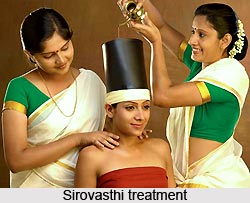 Sirovasthi Treatment is the ayurvedic term in the lexicon of ancient treatment applied to the procedure of allowing medicated oils to bathe on the head for a prescribed period. Sirovasthi is one of the effective treatments in ayurveda. This mode of treatment is practised in Kerala, Karnataka and Tamil Nadu.
Sirovasthi Treatment is the ayurvedic term in the lexicon of ancient treatment applied to the procedure of allowing medicated oils to bathe on the head for a prescribed period. Sirovasthi is one of the effective treatments in ayurveda. This mode of treatment is practised in Kerala, Karnataka and Tamil Nadu.
Sirovasthi Treatment is useful for many diseases of the head, face, and central nervous system. Sirovasthi is ideal for facial paralysis, Migraine Headache, head ache, insomnia, memory loss, mental stress, dry nose, dryness of the eye and also for cervical spondylosis.
Though this is useful in all Dosha types of ailments, Sirovasthi Treatment is more useful in Vata Dosha related diseases. The timing and periodicity of Sirovasthi Treatment varies according to the state of the patient and type of disease. Usually, the doctor gives a 7 or 14 day treatment course.
Process of Sirovasthi
A bandage is tied around the patient`s head and a cap with an open end on top (like an open-ended chef"s hat) is secured. The medicated oil, warmed to body temperature, is poured into this cap and allowed to soak into the scalp. Sirovasthi Treatment is highly recommended for facial paralysis, dry mouth or nose, and several head conditions.
Sirovasthi is an effective treatment in Ayurveda for nervous system disorders of the human beings. In this therapy of Sirovasthi, the warm medicated oil is retained over the head for a certain amount of time.
This oil is a mixture of gingely oil, castor oil, ghee, common milk, and various herb extracts. Herbs and oil are boiled in a special way in order to extract their full medicinal properties and the ayurvedic properties of these natural beings.
The first step of Sirovasthi treatment in Ayurveda starts with the application of warm herbal oil all over the body. This treatment nourishes the nerve endings and prepares the body for the main treatment. Then a cylindrical shaped leather cap of about ten inches height and both ends open is fitted around the patients head. There are certain mixtures of the lukewarm herbal oil which is prescribed by the Ayurvedic physician according to the individual body type and is poured into it. Normally the oil of ayurveda is retained on the head for about 30 to 45 minutes.
The timing and duration of the Sirovasthi treatment varies according to the condition of the patient and type of diseases like Bell"s palsy, dryness of the nose, mouth and throat, severe headaches and other disorders in the region of the head. Usually, the doctor prescribes a 7 or 14 day treatment course.
As a part of the whole treatment of Sirovasthi, the doctor will also give instructions about the person"s diet patterns and his oral medicines.
Sirovasthi treatment is mainly useful in facial paralysis, dryness of nostrils, mouth and throat, severe headaches, burning sensation of head, eye diseases, diseases of cranial nerves and hair fall. Sirovasthi treatment is also helpful to perk up the memory of the brain and vision of eyes.




















